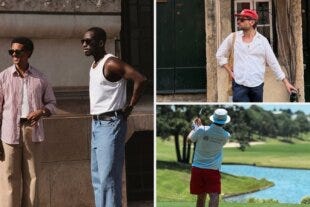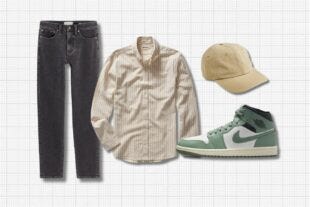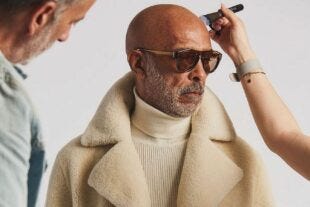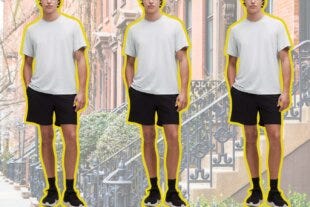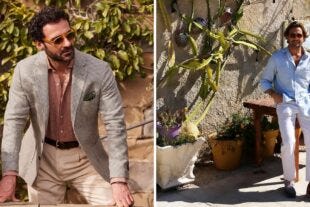There are a few celebrities whose voices respond in my brain when I’m seeking guidance, WWJD-style. They don’t know it, but there they are, swirling around all the time, like an un-corrupted version of Meta’s AI.
Looking in my closet, I think: What would Gwyneth Paltrow wear to this business dinner for a slightly elevated yet effortlessly casual effect?
When deciding how to respond to a particularly passive aggressive text, I think: How would Keke Palmer respond with just the right mix of wit and charm?
And when it comes to Style Girlfriend, when figuring out how to connect with men in a way that holds space for masculinity and accountability in equal measures, I think: What would Judd from The Real World: San Francisco say?
Judd Winick, now 55, rose to prominence on arguably the best season of the MTV reality show, alongside other then 20-something Gen Xers like Puck, Rachel, Pedro, and his now-wife Pam.
The illustrator and AIDS activist always struck me as a good guy—one who got the girl, stood up for his friends, and even managed to snag a kid’s fantasy of what a grown-up job could be.
I reached out to Winick to get his take on modern masculinity, comic book superheros, and the invention of the reality show villain.
MC: Let’s start with your Instagram.
A lot of the comments have a common theme of, “Your season of Real World was so formative for me!” And I’m just curious why you think the San Francisco cast resonated so much with people?
JW: So, it’s 31 years ago, and I think a lot of those folks were teenagers when they saw it, so that’s just a very formative time.
We were aspirational people in our 20s and in hindsight, seeing what reality TV became, what the culture became, how much of the idea that your private life is your public life became a part because social media became everything.
This is just what we are.
There’s also something that was interesting and almost quaint about The Real World in general, and to our season specifically. It was one of the very few times that reality TV actually accomplished something in a real way, so that means something, and it’s all because of Pedro Zamora.
MC: Pedro…and Puck.
It’s a two tiered thing, which is that you had Pedro, who was doing the show for all the right reasons, and then you had Puck, who was like the invention of a reality villain who would kind of create this boilerplate of doing reality TV for what you could call the “wrong” reasons.
That’s oversimplifying, but the number one show on MTV at that time was Beavis and Butt-Head. The number two show was The Real World, and Puck was like the living embodiment of Beavis and Butt-Head. So it became good television.
But in hindsight, we were just seven people living in a house, and it wasn’t a game show. We weren’t competing. We were just living there.
And very important things happened, and things that over thirty years later still have resonance.
And I think that for us personally, meaning me and Pam, people’s reaction so often is like, when they find out that we’re still together, they’re just so happy that we’re still together, you know? They’re just so thrilled that we haven’t gotten divorced. And it’s sweet. It’s weird, you know, weird in the sense of, like, you know, it’s a low bar. Half of all marriages end in divorce, and we haven’t.
I guess they just want to cling to a little bit of an emotional life raft.
MC: You’re like the John Mulaney prototype of a parasocial relationship.
JW: [laughs] Yeah, I guess so.
I mean, I’m out there. I’m on social media a fair bit. I’ve been doing a book series for ten years. I do press. You know, I’m not hiding or anything.
But Pam went on to the show as a medical student, and now she’s a doctor. I went on to the show as a budding cartoonist, and now I’m a cartoonist. We are exactly what we said we were going to be, and I think there’s some comfort in that.
Especially considering what reality TV became and what social media became.
MC: You’re not pushing skinny teas now.
JW: No, we’re not.
You know, we never did any of the — and this is not a knock at all — but we never did any of the Challenges.
We never did any of the other stuff they had asked. We had jobs and things to do. I mean, Pam in particular, she’s a doctor. She doesn’t have time, or an inclination to do the challenges. If we’re gonna, you know, put on Speedos and sit on a block of ice for a competition, we’re gonna do it for our own pleasure, not for money or on television, on your own time, [laughs] just for us.
MC: You and Pam both are quite publicly civically engaged. Why is that important to you?
https://www.instagram.com/p/DIFB7tQhgt0/?utm_source=ig_web_copy_link&igsh=MWU5MmxmeWp0cDBtcw==
JW: Because we can and we should, and I mean that in the least Pollyanna way.
We had decided at one point, several years past the show that we weren’t going to do any more press around The Real World.
Literally, the last thing we did was the E! True Hollywood Story of The Real World. We were driving back from the interview and just both kind of looked at each other like, I don’t want to do that anymore.
We just didn’t want to talk about The Real World that way anymore, but we did want to always talk about Pedro.
If anything ever came up, and anyone, any time, wants to talk to us about Pedro and his life and what he’s done, and what he did, and how his story still resonates.
And a lot of that purely has to do with — because we can.
We were on this show, and people are willing to listen to us, and he was our friend for a very intense and brief time.
You know, there are people who are in his life much longer than us. He has family who raised him and are part of his life, but we were the ones who are on television with him. So we get to do this — to support the gay community and be good allies, and talk about the need for really comprehensive sex education for young people and AIDS and HIV care.
We have always felt that we owe that to Pedro. He can’t do this, and he would be doing this, and we would be supporting him.
MC: How do you think about modern masculinity as it relates to Gen X’ers?
And why do you think so many men of your generation have had their brains curdled by darker parts of culture and the media?
JW: Maybe it’s just the glacial pull of generations.
You know, boomers were hippies. They were on the front line of fighting against the Vietnam War, and it was incredibly important, and they did incredible things. And now a lot of boomers suck.
Are we sliding into that as well? Are we just becoming, like, old people who are crotchety and does it happen every time? Where we were supposed to be the generation that was going to break the mold, and yet..?
It’s funny. If I’m talking to someone younger than me, I feel the need to apologize because it isn’t just the generation above us who screwed up. We’ve obviously screwed up, too.
But when I was in my 20s, the worst thing you could be was a sell out. Try explaining that to a 15-year-old now. Because you’re on your phones all day constantly promoting yourselves.
Like, is that selling out? That was considered a bad thing.
MC: You sound self-aware about it at least.
JW: I try.
In my 20s and 30s, I would, when talking about things around issues around race, I would say, Well, yeah, clearly I’m racist. And it would be like, What do you mean by that?
Like, now it seems crazy to say that aloud. You can’t possibly do that. It’s not safe to say that.
But you know, I grew up as a cis white dude in the 70s and 80s, and I was fed all these various stereotypes, and I hang on to those stereotypes. I still have those stereotypes.
Now, it’s what I do with those stereotypes — not what I think, but what I do — is what defines me.
So I’ve always sort of owned those tendencies, but I push against them. I try to be a better person. That’s what we’re all supposed to do. That’s the lowest bar imaginable.
You try to be a better person and acknowledge that we’re far from perfect, and acknowledge you can always get better somehow. To keep an open mind and try to call out shit when it’s when it’s wrong. And we should do more of that on social media and on Reddit.
MC: It’s a low bar.
JW: That’s the “Me Generation” of the 80s for you.
There was an entire movement about around truth, which still happens of, I’m just being honest.
You know, Oh, you look terrible. What? Or, No offense, but…
Are you trying to help, or are you just being a dick?
With our children, it’s like, just don’t be a dick, all right?
We actually say that. It’s important to realize that your opinion is not the only opinion, and it’s okay to listen to other people.
MC: What do you think is harder and what do you think is easier about becoming a man today than when you were figuring it out?
JW: There were always these images and movements and philosophies about what it was to be an adult, to be a man.
Now that’s with rocket fuel. Now it’s on crack. Now it’s everywhere.
We had this technological quantum leap forward, that you can reach into your pocket and you have a computer in your pocket that has all the world’s information at your fingertips at any time, all day long.
Then we created this thing where you’re looking at other people all day long and judging yourselves against wherever you decide to look. And that’s hard.
Pam is a doctor, a tobacco researcher. So she fights Big Tobacco, and in her research there’s these insane ads and commercials of smoking from the 40s and 50s. Pregnant women with a cocktail holding a cigarette, you know, and it seems totally insane.
Or, you know, like a dad, they’re smoking with children around. It’s nuts! It’s nuts.
Fifty years from now, are they going to look at the fact that we were giving five-year-olds tablets, like, Can you believe they did that?
Knowing what we know now and the damage that it did to us. The actual psychological trauma that is brought about by social media and screens.
It seems likely that we’ll look back on all this, like, Can you believe that? In the 2040s we’ll all say, Oh no, no, throw all your tablets into the ocean, it’s the safest thing you can do.
MC: 2040 seems like an optimistic timeline.
JW: I know.
I was gonna get really science fiction-y and say 2080 but I wanted to cut it back a little bit to be more hopeful. I couldn’t help it.
MC: Is there any part of you that would have wanted to grow up now?
Or are you like, Thank fucking god that I grew up without a phone in my hand? Without social media?
JW: I never thought about it like that.
I’ll put it this way. I have a fairly vivid imagination, as you might imagine. I write and draw a children’s book series about a kid from another planet who flies around and shoots lasers out of his hands. So, I live a fantasy life. I always have.
But I have never thought about being a young person now.
I think social media sucks. I really do. I think it’s bad. I think it was like most things that we as humans come up with – great promise, and then, of course, the horrible part took hold and worked towards our baser instincts.
We’ll see. I think everything is going to go smaller. I’m on Nextdoor. We thought we lost our cat, and I went on there and reached out. We found the cat – he was in the garage for two days. But suddenly, I’m like, I want to go on Nextdoor and put it out there to everybody. To our neighbors. That’s what social media could be like.
MC: I want to ask you one more question, about your book series.
I am curious how you sneak in the vegetables, in terms of integrating your values into your graphic novels? How consciously are you thinking about that when you’re writing these books that are going to be raising the next generation? How much is that at the forefront of your brain being like, Let me not fuck this up?
JW: When I was writing superhero comics, I was introducing gay characters into my comics, more women, more people of color. And almost immediately I was the “soapbox comic book writer.”
But when I started doing graphic novels, I just kept doing the same stuff I was always doing. Of my three lead characters, one happens to look like a blonde-haired, blue-eyed, white kid who turns out to be a robot.
And then there’s this little boy who’s Asian, and a little girl who’s black.
It’s just, that’s who are the people in the world. And when it comes to the genre of superheroes and adventure, it’s mostly been white dudes forever. So my stance has always been, I think we can handle having a couple of people of color in there, a couple of women in there, and it doesn’t change the stories. It just makes it a little more interesting, because it’s more fertile ground.
But I’ve been doing my Hilo series for 10 years, and I’ve gotten to experience it firsthand, where you have, you know, black kids and Asian kids who literally tell me, “Oh, Gina is my favorite character.” “Yeah, why?” “Because she looks like me.”
All the tropes and all the cliches about them that they want to be seen. It’s all true. It’s all absolutely true. And it’s a small thing that makes a huge difference.
If kids feel more engaged, they feel more seen, they’re happy.
And you know, in that, I’m still telling these big old action adventure stories about giant robots and monsters and, you know, fighting bad guys and all those things.
But at the heart of it, it’s always about being a decent person.
There’s heroes, there’s villains, and even the villains, we get some kind of a gray area too. Maybe there’s a reason they got there, and we try to explain that.
You know, not everyone is all bad, but creating characters where we show a little bit of everybody, to me, that’s the world we live in. That’s all it is.

